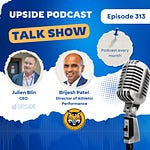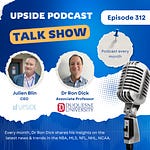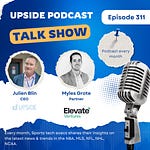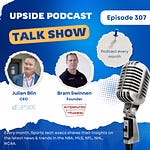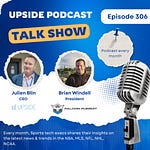This week, we have the honor to interview Andy Etches, Founder of Rezzil, a leading sports technology company focusing on VR, AR and data.
The Rezzil platform is complementary to field work, using drills designed and tested by the world’s best players: Rezzil improves cognition, decision making and overall resilience. Rezzil drills are academically shown to identify a player’s strengths and areas to improve; with scores on accuracy under pressure, technical adaptability and their proprietary Rezzil Index players can quickly see how to step up to the next level.
The two products that Rezzil offers to teams are Rezzil Index and exar.live:
Rezzil index is a Cognition assessment system and a different levels of the game. It's also being used by teams quite heavily for recovery and long term injuries. Rezzil Index also allows teams’ scouts to build a comparable quantifiable report of a specific player.
exar.live - analysis is a tool that reads data from existing lead data like Second Spectrum in the Premier League which provides point data on all players and their positions at any given moment and their post data. They can ingest that and then turn that into something that you can either use in a headset to relive that moment or teams can watch back on a touch screen.
Here is a picture of Rezzil dashboard:
Here is a video providing an overview of Rezzil index:
Here is a video providing an overview of Rezzil data visualizer:
Rezzil is also trusted by sports brands and sports organizations such as the adidas, Nike, Mercedes Benz, Red Bull, the NFL, the Atlanta Falcons, the NBA, Juventus, Manchester City, just to name a few.
📝Show Notes: Through this interview, we touched on his background, and his company and product. We also discussed the benefits for sports organizations and athletes to use his products. Lastly we talked about their competitive advantage, business model and plans for the next 12 months.
Best Quotes: Here’s some of the key discussion points and best quotes from our conversation with Andy:
On his background:
“I've done a number of different roles across sport and data. Anything involving technology, and trying to make technology easier to understand and interact with, is where my sweet spot is. And that's kind of where we landed out with Rezzil.
On he got the idea to create Rezzil:
“So in Rezzil there's myself and there are two other founders. These two other founders had worked together for a few years before we all came together, and they were specializing in VR technology, and there was obviously myself who is specialized in data. We all came together and created the product that you see today”.
On the Rezzil products from VR training to data services:
“The main crux of the product and what we're trying to achieve with it is in the VR sense. And it was to try to make things that are really difficult to assess and quantify things like cognition, decision making, pressure coping mechanisms, things that scouts see, but that are really hard to quantify numerically. So we tried to make that a reality using VR”.
“VR is a brilliant tool for that because we can create scenarios. We can measure really accurate reaction times. We can measure all kinds of biometric markers like scan frequency, pupil dilation, basically anything, that you'd want to look at all whilst immersing the player in an environment that feels natural and real. We've worked a long time to get it right and I think we've got a product now that ticks all the boxes”.
“So we have VR training at all levels of the game. We also have data services. We also have a publicly facing side to the business, which is consumer focused products like gaming, and training as well”.
On how his products (Rezzil Index, exar.live) are used by teams, and how they work:
“The two team focused products that we have are Rezzil index and a product called exar.live which powers everything that we do generally. Rezzil index is a Cognition assessment system and a different levels of the game. It's also being used quite heavily for recovery and long term injuries”.
“When it comes to cognition assessment, the way that it's put together is a series of mini games. So it is essentially five little games back to back and each one of these games is designed to look for a scouting characteristic. So something that a scout would typically look for is So combination link up play, awareness on the field, passing and receiving under pressure, how players react to certain stimulus, whether they cope well with failure, all kinds of things like that”.
“I try and put that in a number because obviously scouts can't be everywhere. Sometimes scouting reports are quite lengthy and just detailed words as opposed to be an exact number with certain characteristics that are stronger than others. Rezzil Index really allows you to do that and build a comparable quantifiable report of a specific player. It's been proven academically as well, which is probably the strongest point so there's a number of studies out there that are public and there's some that aren't public that will probably rear their heads in the next year or so that really show how capable is delivering even at a first team level”.
On how some Premier League teams are using Rezzil Index today as part of their players’ return to play:
“Premier League teams, for example, will use Rezzil Index when players are injured as well. So if you've got an ACL injury like we've got, I can't even count how many players we've dealt with now. If you've had ankle ruptures, ACL injuries, lower limb, and problems where contact with a real ball is quite difficult and that won't happen for some time. But players want to engage with the ball. They want to engage with an unpredictable stimulus. They want to start to move and bring natural movement patterns back into their routine.
So we're really good at doing that. We can generally get people moving around a bit more naturally six weeks post surgery sometimes. It depends on the player obviously but it really powerful for that. The players love the use cases there and it's just growing and growing”.
On how Rezzil exar.live - Analysis works:
“The other product we have is exar.live - analysis, which is a tool that reads data from existing lead data like Second Spectrum in the Premier League, for example, which provides point data on all players and their positions at any given moment and their post data”.
“We can ingest that and then turn that into something that you can either use in a headset to relive that moment or you can watch back on a touch screen. You'll probably see on TV even where basically someone jumps into the eyes of a specific player and looks at it from their perspective. There's usually us that powers that type of system on TV. It's a really powerful tool and that's just going to become more and more prevalent as time goes on”.
On who the typical users (Scouts, performance directors..) of their products within teams are:
“I think that depends on the place in the pyramid. At the first team level, generally, we're not trying to improve players from a performance perspective. Generally we're there when it's rehab or when players have confidence issues and so on. We're there to bring players back on the field as opposed to helping players improve their performance although we have done quite a few experiments of first team improvements in certain really high characteristics”.
“Our products are also being used by scouts, performance directors, and people who are looking for players and who are trying to assess whether players are ready to graduate to the next level of the game or whether they are ready to recruit a player, for example. Those are the two strongest use cases for us”.
On what teams like the most about Rezzil products such as the fact that its VR products do not create motion sickness, and are fun and engaging:
“I think the biggest one about our VR products is that there's no motion sickness.
So anyone who typically tries VR products will often report things like “I feel sick, I don't feel well”. So with our VR product the number one feedback we get is that that doesn't happen with our system, ever. So that usually surprises people straight away”.
“The other comment we get is that it is fun and engaging and useful for those three things. That's what we're trying to do for engaging, useful, and make a little impact on the daily schedule as possible. So it's something that players can pick up on their own, or it's something that you can schedule in a specific workflow, or specific pattern of programs that you want that player to work on at any given moment. So generally speaking the feedback we get are exceptionally good, even in a really difficult environment”.
On some success stories with players like Bradley Dak (Blackburn Rovers/Premier League) and the Red Bull’s athlete performance center in Salzburg:
“I think one of my favorite success stories with an athlete was with Bradley Dak, a player from the Blackburn Rovers (Premier League) a couple of years ago. Back then Bradley suffered a second ACL injury in two years, and obviously that's a really difficult thing to overcome, not just from a physical perspective, but from a mental perspective”.
“Bradley obviously is a really great guy and has a really brilliant approach to the game to begin with. But when you have an ACL injury for the second time, you're obviously going to feel a little bit demotivated. From what we heard from himself and from people around him, he engaged with Rezzil really early on in that second recovery”.
“I've actually got a video of him taking some really tentative steps. Usually players won't kick a real ball for months. And in this video, he's kicking a virtual ball really early on in that recovery, and it was a really positive thing to see. And it's something that we've seen so many times across so many different players”.
“And there is a completely different use case such as the work that we do with Red Bull and their athlete performance center in Salzburg. They use Rezzil for players’ assessments both through injury and for preseason assessment as well. So we're working with them to develop very specific products that are not unique to them, but which update some of the existing protocols that they have in place. And Rezzil makes them a bit more engaging and more relevant to the sport that the athlete uses. So it's a really cool use case”.
On the types of sports (Soccer (French Football Federation), basketball (NBA), American football (NFL) and F1) using Rezzil:
“I'd say the four sports that we're most competent in currently would be soccer, basketball (NBA), American football (NFL) and F1. Those are the sports where we have active users that are using it on a regular basis. And we've done really unique stuff for those people in those specific sports that isn't public yet”.
“You'll find a really wide range of users. For example one of the F1 drivers, and we can't name his name, is using Rezzil for his pre race and he'll use it to warm up and so on. Another example is Galatasaray's first team goalkeeper who uses it and a number of Premier League goalkeepers, including Emmy Martinez who posted a video on his Instagram of him using that same game that anyone can buy to use it, but he's using it in a football specific context”.
“In the NFL we're working with the Atlanta Falcons, and Emory Spark Hospital. In the NFL they're doing football based games with their NFL players. And some of the football based games have been done for basketball players and the other sports that they deal with there. We also work with hockey teams. We have some really, really broad use cases, but our core focus is within those four sports currently, but we're definitely trying to branch out as much as possible”.
“We also have a very close relationship with the French Football Federation and their Centre of Research at Clairefontaine, which is going to become more and more important over the next couple of years. We also work very closely with the Bundesliga and their new tech lab in Frankfurt. From a league based perspective, those are probably our biggest relationships. However, we are obviously growing and we've got teams in lots of leagues around the world such as Mexico, Spain, or Norway and all kinds of countries”.
On the fact that they will be supporting AR/VR devices in the market:
“We'll be launching products on pretty much every AR, VR devices in the market. You'll see, for example, the Meta Quest pro as a Mixed Reality device. It's in market currently and it is being used by our American football partners to do almost full field base movement patterns. So we've got a pocket training game for them that allows QBs to move around”.
On the type of AR experiences they offer and the fact that they can combine their AR/VR experiences with various types of sensors (Motion tracking, EEG, HRV..):
“And that the players can see the real world around them, but all of the objects that they're targeting or people that they're trying to avoid are augmented. So that's a really interesting way to interact with it in terms of interlinking with third party hardware as well. All of our platforms have lab streaming layer enabled”.
“So our system can talk to things like force plates, or motion tracking software. We can couple up all of our movement patterns and scoring with standard lab equipment as well. So not a lot of people are actually aware of that, but it does. It gives you a different insight. So if you do want to track heart rate variability (HRV) at the movement the point of stress for a player happens, or if you want to track pupil dilation or even EEG behavior while players are moving or sat in a Formula One car, it's possible with what we built”.
On their competitive advantages such as their team’s versatility, their 3 PhDs on staff, computer science and computer graphic experts:
“I think our versatility for one is a competitive advantage. The fact that we are fast responding to what people want in our platform. We don’t have a problem about changing it for people's requirements and needs. If someone says to us, it'd be great if you could do that generally, we'll be like, okay, let's make it happen. That's a real strength”.
“What we hear is that all the technology companies don't respond quite well and as fast as we do. So we have seen companies that have been used by teams and haven't updated their system in years, let alone months. With us we're more likely to update our system in weeks. So that's a big competitive advantage”.
“And then I think just the fact that we've got such a wide coverage of capability within the business. So we've got three PhD employees now, and we've got computer science experts. We also have data science AI computer graphics experts. So some of our environments are more realistic than than anybody else. They're almost high level computer gaming style graphics, the same kind of stuff you'd see in Call of Duty or in FIFA. And that experience really does matter when you try to get buy in from a player”.
On their business models and pricing:
“So Rezzil Index is really straightforward. It's $5000 annually or 500 per month. There's no limit on the amount of users under that. The differences that it's concurrent headsets. So obviously if you need two headsets, you need two licenses. Obviously we discount as you go up. But that's a pretty straightforward product”.
“Regarding exar.live, the analysis tool, it is Team based, and it's a quite similar pricing on an annual basis, but we also have individual licenses for that too. So if there's just one user in the team, we don't want to make it unachievable to most people to be able to get into it. So we're quite flexible on that side”.
“And then finally there's bespoke. So we do a lot of products for people that are really bespoke to their needs. So, for example, we mentioned Red Bull before. They've got 200 different sports that they deal with, although we deal with them predominantly through football, there are things that they require that are totally different to what everybody else would want”.
On the best way to reach out to him and the Rezzil team:
“I'm really straightforward to get a hold of. My email is just andy@rezzil.com. And you can either see some more information on our website, although it's not very detailed because we are slightly opaque, just because we want to maintain a competitive advantage, but we're quite happy to talk to everybody and give demos in person”.
On their plans for the next 12 months:
“We're currently fundraising although I think we've completed it. We are also expanding into all the leagues as much as possible, which is a work that we're doing with the NBA.
And we're trying to build connectivity between the three products that we have. So XR Live that has data can feed into Rezzil Index and those, all of a sudden, become useful to that product and integrate certain elements of real game data into the training environment and so on and vice versa.
So I think you'll see more connectivity between everything that we do, and hopefully a clearer messaging as well, so it's easier to understand what we do. And you'll be more vocal about some of the new partnership that you have in the pipeline. we've got something pretty cool building on that side”.
You may also like:
🔥 Upside Chat: Dave Hancock, CEO, Apollo (Leading Athlete Management Systems (AMS) vendor)
🔥 Upside Chat: Dr Andy Barr, Consultant, Brooklyn Nets (NBA) & Quantum Performance Founder






